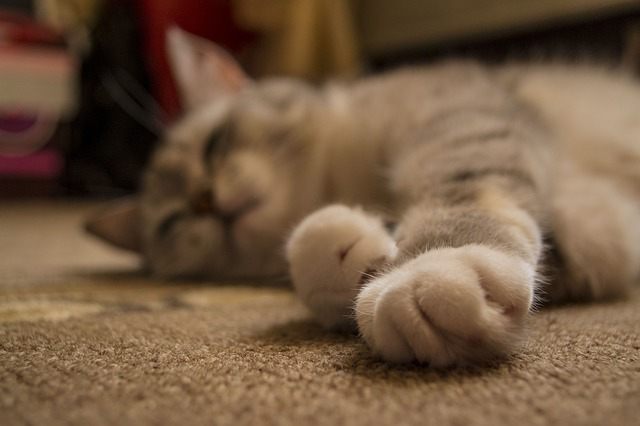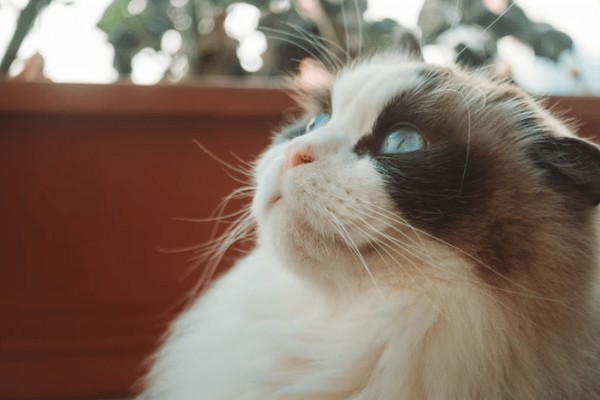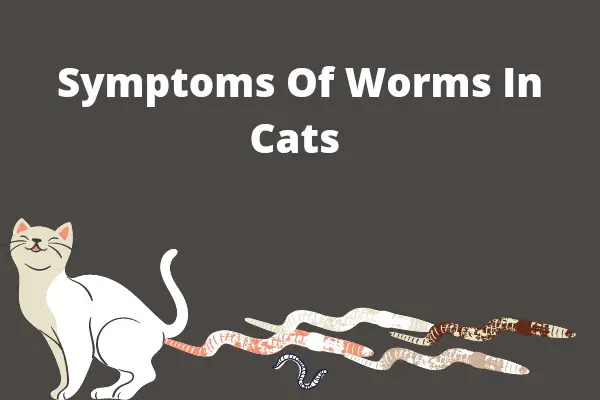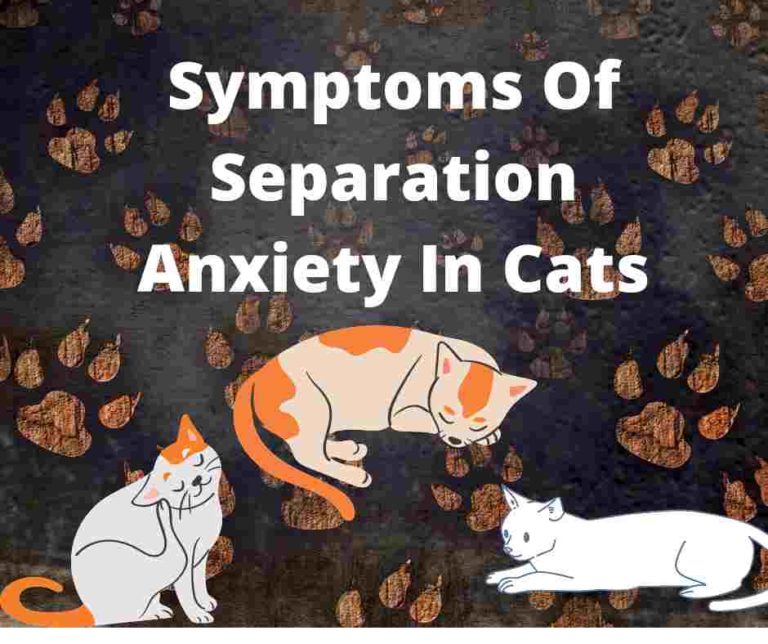10 Cat Stomach Problems Symptoms & Tips

Cat stomach problems symptoms are exactly what this post is all about and if that is what you are searching for then stick around.
In this article, you get a few of the common cat stomach problem symptoms, these are signs that something is wrong with your cat, and you should not overlook these signs.
Cats have a very good digestive system, but the presence of bad materials could distort the activities of the whole digestion system.
Therefore, when you notice any of the below-listed symptoms persistently you need to see your cat’s vet.
Recommended article: 12 ways cats get bacterial infections
Cat Stomach Problems Symptoms
Here are the most common cat stomach problems symptoms you should always look out for in cats;
1. Vomiting
Giardia is a parasite that lives on the lining of your cat’s small intestine and this causes distortion in every digestive activity.
When the digestive tract of a cat is occupied with parasites or harmful objects the end product is vomiting.
When ever you see your cat vomiting constantly be rest assured that something is wrong with your cat.
The presence of any harmful object in the stomach of a cat always makes a cat uncomfortable and this end up forcing the cat to throw up.
Hairballs can also cause the cat to vomit, and the hairballs are formed in the stomach as the cat keeps ingesting fur.
Remember to always seek medical attention when you notice constant vomiting with your cat.
Must read: Symptoms of bacteria infection in cats.
2. Constipation
Constipation occurs in cats when the bowel movements become less frequent and stools become difficult to pass.
In cats, This happens most often due to changes in diet or routine, or due to inadequate intake of fiber.
Constipation is a clear cat stomach problems symptoms so watch out for it in your cat.
Learn more about sick cat symptoms.
2. Diarrhea
Frequent diarrhea and other signs of an upset stomach in your feline companion could be a sign of a gastrointestinal (GI) or digestive disorder.
Diarrhea is seen as loose, watery stools that occur more frequently than usual.
Diarrhea in cats is usually caused by a virus, or bacteria, ingested through contaminated food.
Less frequently, in cats, it can be a sign of another disorder, such as inflammatory bowel disease or irritable bowel syndrome.
Recommended: Different ways indoor cats get parasites.
3. Struggles to eat
One of the major cat stomach problems symptoms is the struggle to eat this is because the internal organs are not balanced.
In this case, if your cat rushes out to feed but finds it hard to eat, then definitely something is wrong with your cat’s stomach.
When your cat continues to struggle to eat each time you feed the cat then you should consider seeing a vet.
4. Weight loss
Weight loss in cats can result from a decrease in body fluid, muscle mass, or fat in the body of a cat.
A decrease in the body fluid of a cat can come from medications, fluid loss, lack of fluid intake, or illnesses such as diabetes.
Most times in cat weight loss in cats show as after effect when something is already wrong.
It is a good practice as a cat owner to always check the weight of your cat from time to time.
Learn more about the signs of a traumatized cat.
5. Painful abdomen & Swelling
Painful abdomen or swelling abdomen in cats can b as a result of many issues in the stomach of the cat.
This is usually the sign or after-effects of an illness in a cat.
Possible causes of the painful abdomen in cats
Here are the primary causes of the pain and swelling abdomen in cats;
- Urinary obstruction
- Ruptured bladder
- Cancer
- Poisoning
- Pancreatitis
- Dietary intolerance
- Kidney stones
- Feline infectious peritonitis
- Bacterial infection
- Parasites
- Intestinal obstruction
Learn more about common cat health problems.
6. Loss of appetite
Loss of appetite in cats is a clear cat stomach problems symptoms and shows that something is really wrong with your cat.
Loss of appetite in cats is also known as anorexia and could be caused by many factors.
Causes of loss of appetite in cats
Here are the causes of loss of appetite in cats which includes the following;
- Kidney disease
- Cat flu
- Diabetes
- Fever
- Hyperthyroidism
- Pancreatitis
- Ingestion of poison
- Infections
- Cancer
- Parasites
Read more: Possible reasons why your cat stopped eating.
7. Weakness
Weakness in cats is a clear cat stomach problems symptoms and shows that something is really wrong with your cat.
8. Flatulence
Flatulence in cats is a clear cat stomach problems symptoms and shows that something is really wrong with your cat.
This is a clear indication of the intake of air in cats and could be a result of the following.
Causes of Flatulence in Cats
Here are the common cause of Flatulence in cats;
- Swallowing a lot of air
- Intestinal parasites
- Overeating
- Consuming spoiled food
- Digestive disorders
- Diet
- Inflammatory bowel disease
- Intolerance
- Allergies
9. Regurgitation
Regurgitation in cats is a clear cat stomach problems symptoms and shows that something is really wrong with your cat.
In cats, this is seen as the action of bringing swallowed food up again to the mouth after eating.
Causes of Regurgitation in Cats
Here are the common causes of regurgitation in cats;
- Esophageal tumor
- Ingestion of foreign body
- Lead toxicity
- Botulism
- Idiopathic
- Hypoadrenocorticism
- Hairballs
- Worms
Recommended post: Why your cat is losing weight.
10. Lethargy
Lethargy in cats can be described as tiredness, weariness, fatigue, or lack of energy.
It can be accompanied by depression, decreased motivation, or apathy.
This is clear cat stomach problems symptoms and shows that something is really wrong with your cat.
Lethargy in cats can be a normal response to inadequate sleep, overexertion, overworking, stress, lack of exercise, or boredom.
Causes of Lethargy in Cats
Here are the common causes of lethargy in cats which are as follows;
- Side effects of medications
- Arthritis in cats
- Too much stress
- Overfeeding
- Hairballs
- Depression
- Lack of exercise
- Cardiovascular and Pulmonary Disorders
- Asthma
- Cancer
- Inadequate sleep
- Overexertion
- Boredom
Common Cat Stomach Problems
Here are some common cat stomach problems:
- Constipation: This is a common problem in cats and involves difficult or infrequent bowel movements, which can be caused by a variety of factors including diet, dehydration, or underlying medical issues.
- Gastrointestinal (GI) Disorders: These can involve various parts of the digestive system, and can be caused by infections, inflammation, or other underlying conditions.
- Inflammatory Bowel Disease (IBD): This is a chronic condition that results from inflammation in the digestive tract and can cause vomiting, diarrhea, weight loss, or other symptoms.
- Foreign Body Ingestion: Cats can sometimes ingest non-food items, which can cause blockages or irritation in the digestive tract.
- Pancreatitis: This is a condition where the pancreas becomes inflamed, which can cause vomiting, diarrhea, loss of appetite, or other symptoms in cats.
- Hairballs: Cats commonly groom themselves and can end up ingesting hair, which can build up in their digestive tract and result in vomiting or constipation.
- Colitis: This is an inflammation of the colon that can be caused by a variety of factors, including diet, stress, or underlying medical conditions.
- Gastritis: This is an inflammation of the stomach lining that can be caused by a variety of factors including infections, medications, or underlying medical conditions.
- Intestinal Cancer: Cats can develop cancer in their digestive tract, which can cause weight loss, vomiting, diarrhea, or other symptoms.
How to prevent stomach problems in cats
Here are some common ways to prevent stomach problems in cats:
- Provide a high-quality diet: This should be the cornerstone of any plan to prevent stomach problems in cats. Try to find a food that is high in protein and doesn’t contain a lot of fillers or other ingredients that may be difficult for cats to digest.
- Avoid table scraps: Many human foods are not appropriate for cats and can cause digestive upset. It’s best to stick to a diet of high-quality cat food and avoid giving your cat table scraps.
- Feed your cat on a regular schedule: This can help prevent stomach problems by keeping your cat’s digestive system on a routine.
- Offer plenty of fresh water: Adequate hydration is important for maintaining digestive health in cats.
- Regular veterinary checkups: Regular checkups can help detect health problems before they become serious and can allow you to discuss any concerns you may have with your veterinarian.
- Address dental issues: Dental problems can prevent cats from properly chewing their food, which can lead to digestive issues. Regular dental cleanings and good dental hygiene can help prevent these problems.
- Avoid sudden diet changes: A sudden change in diet can cause digestive upset in cats. If you need to switch your cat’s food, do so gradually over the course of several days.
- Reduce stress: Stress can contribute to digestive problems in cats. Keeping your cat’s environment as stress-free as possible can help prevent stomach issues.
- Keep your cat’s living space clean: A clean litter box and living space can help prevent the buildup of harmful bacteria that can cause digestive problems.
Related questions
What are some common symptoms of stomach problems in cats?
Some common symptoms of stomach problems in cats include vomiting, diarrhea, appetite loss, lethargy, and excessive drooling.
How can I tell if my cat’s stomach problems are serious?
If your cat shows any severe symptoms such as blood in the vomit or diarrhea, severe pain, or a distended abdomen, it’s important to seek immediate veterinary care.
Learn more about why your cat is lethargic and not eating.
What are some possible causes of stomach problems in cats?
Stomach problems in cats can be caused by a variety of factors, including dietary changes, infections, allergies or intolerance to food, foreign bodies, pancreatitis, or even cancer.
Learn more about keeping your cat hydrated.
How can I help prevent stomach problems in my cat?
Providing a consistent and balanced diet, avoiding table scraps and human food, being mindful of your cat’s sensitivities or allergies, promoting exercise and hydration, and maintaining proper hygiene and parasite control can all help reduce the incidence of stomach problems.
What treatments are available for cat stomach problems?
Treatment for cat stomach problems depends on the underlying cause but can include dietary adjustments, medication to manage symptoms, supportive care such as hydration or intravenous fluids, or even surgery in some cases.
Can stomach problems in cats be cured?
Depending on the cause and severity of the problem, some cat stomach problems can be cured while others may be managed with ongoing treatment and care.
Your veterinarian can provide advice on the best course of action for your cat’s specific situation.
Conclusion
In conclusion, if you notice any of the symptoms of cat stomach problems, it’s important to take action quickly.
By keeping an eye out for vomiting, diarrhea, constipation, and other signs, you can help your furry friend stay healthy and happy.
Remember to consult with your veterinarian if you have any concerns, and always prioritize your cat’s well-being.


![Cat Lethargic Not Eating or Drinking [Reasons] Cat Lethargic Not Eating or Drinking](https://petcreeks.com/wp-content/uploads/2023/02/Cat-Lethargic-Not-Eating-or-Drinking-768x555.jpg)



![How Do You Know If Your Cat Has Rabies [9 Hints] How Do You Know If Your Cat Has Rabies](https://petcreeks.com/wp-content/uploads/2023/04/How-Do-You-Know-If-Your-Cat-Has-Rabies-768x555.jpg)